The Taipei International Percussion Convention (台北國際打擊樂節) takes place once every three years. It was first organized by Ju Percussion Group (朱宗慶打擊樂團) in 1993 and has gradually grown in importance as a major event for percussion musicians. This year, a number of the form’s seminal figures have been invited to perform at the convention, which will include performances from Sunday until June 1 in Taipei, Taichung, Tainan and Kaohsiung, as well as forums by visiting maestros on various aspects of percussion performance.
The convention will open Sunday with Ju Percussion Group performing a program of recently commissioned works including Zhong Kui Marrying His Sister Off (媚影), by Taiwanese composer Liu Yu-yun (劉昱昀), which premiered at the group’s 2008 new season concert Percussion and Friends (打擊樂與他的好朋友們). Although Ju generally operates within a Western classical music tradition, this new work includes not just traditional Chinese percussion instruments, but also stringed instruments that are played as percussion instruments by tapping or slapping. Group founder Ju Tzong-Ching (朱宗慶) said that while the phrase “combining East and West, modern and traditional” are now very much in vogue, Ju Percussion Group was already trying to realize these ideals when it was first founded 26 years ago. Another work, Celebration With Drums and Cymbals (鑼鼓慶) features a lion dance theme, and group members are expected to get involved in the theatrical aspects of the show.
The presence of such groups as Les Percussions de Strasbourg, the first all-percussion orchestra, and Keiko Abe, the first person to play the marimba using six mallets, give the show historical perspective. Other groups are relative unknowns, which is not surprising, given the rapid development of percussion music over the past half-century.
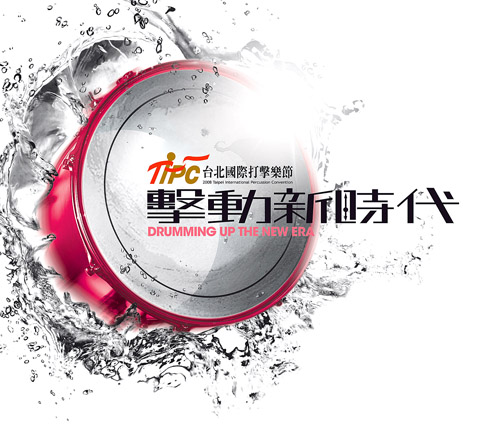
PHOTO: COURTESY OF JU PERCUSSION GROUP
“These days, a new group or style can emerge overnight by featuring in some competition. In the past, to gain that kind of exposure took decades,” Ju said. “Most of these groups are not known to Taiwan audiences, because the change has been too rapid.”
The cross-cultural and trans-disciplinary currents that Ju praises are in full evidence at the convention. There is Odaiko Percussion Group from Spain, which takes its name from a Japanese drumming tradition and mixes it with jazz, flamenco and Indian tribal music; Percossa from the Netherlands, which brings a wealth of street performance experience to its dynamic show, a mix of percussion and physical theater; and the academically rooted experimental music from Steven Schick, the leader of Red Fish Blue Fish, who work closely with contemporary classical composers. For a full rundown of all the performers, see the festival’s Web site at www.jpg.org.tw/TIPC2008.
Taipei Times staff reporter Ian Bartholomew spoke with Ju Tzong-Ching (朱宗慶), founder of the Ju Percussion Group (朱宗慶打擊樂團), earlier this week.
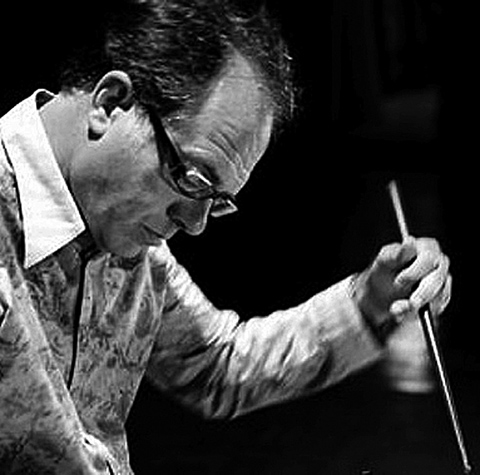
PHOTO: COURTESY OF JU PERCUSSION GROUP
Taipei Times: How is it that percussion music has developed from an auxiliary role to a main role in musical performance?
Ju Tzong-Ching : Any orchestra, when it has achieved a certain level, needs to develop in specific disciplines, whether it is strings, wind, keyboard or what have you. In 1931, the first composition specifically for percussion appeared ... . In the past, percussion had always played a supporting role [in classical music]. At that time, people began to realize that percussion had enormous potential and other works for percussion began to appear. Forty-six years ago, Les Percussions de Strasbourg was formed — they were the first percussion orchestra.
TT: How has percussion music changed over the last 50 years?
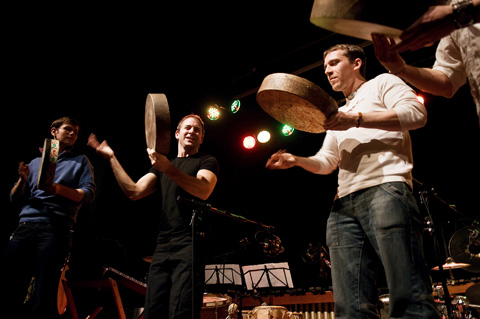
PHOTO: COURTESY OF JU PERCUSSION GROUP
JT: It has greatly extended the sources of its inspiration. Sources of material for new compositions have increased enormously. In the past it was just wood, metal, leather, ... now musicians draw from all sorts of materials that they find around them. This is an enormous breakthrough. There has also been a lot of development in traditional percussion materials. For example, a layer of paper or a metal sheet might be fused with leather to create an exciting new sound. More recently, a new development has been the popularity of world music, so people are using Indian or Chinese music and incorporating it into their compositions. A further stage in this development can be seen in this year’s performances, which is creating increasing diversity through fusions with theatrical elements or technical features such as lighting. It’s changing very fast, with something new emerging every three to five years, [which] is what makes it so exciting.
TT: What changes have taken place within the Ju Percussion Group in response to these changes?
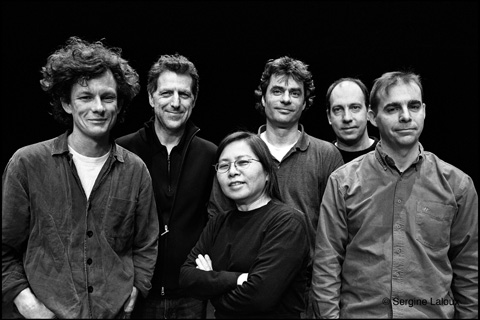
PHOTO: COURTESY OF JU PERCUSSION GROUP
JT: The thing about Ju Percussion Group is that it is incredibly active in performance. We have around 120 performances a year. That is why we’ve needed to split into two groups, with one group focusing on producing innovative modern works while the other focuses on more accessible music for school and university performances. This is a key aspect of our organization. It allows audiences to choose which kind of music they want to listen too ... . Some people will find the modern works difficult, while others might find the jolly environment of our school performances off-putting.
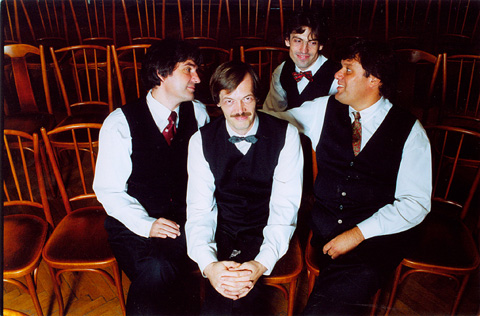
PHOTO: COURTESY OF JU PERCUSSION GROUP
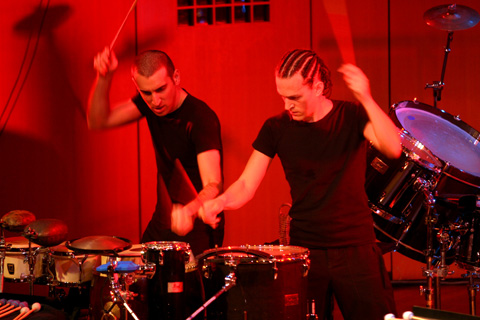
PHOTO: COURTESY OF JU PERCUSSION GROUP

April 28 to May 4 During the Japanese colonial era, a city’s “first” high school typically served Japanese students, while Taiwanese attended the “second” high school. Only in Taichung was this reversed. That’s because when Taichung First High School opened its doors on May 1, 1915 to serve Taiwanese students who were previously barred from secondary education, it was the only high school in town. Former principal Hideo Azukisawa threatened to quit when the government in 1922 attempted to transfer the “first” designation to a new local high school for Japanese students, leading to this unusual situation. Prior to the Taichung First

The Ministry of Education last month proposed a nationwide ban on mobile devices in schools, aiming to curb concerns over student phone addiction. Under the revised regulation, which will take effect in August, teachers and schools will be required to collect mobile devices — including phones, laptops and wearables devices — for safekeeping during school hours, unless they are being used for educational purposes. For Chang Fong-ching (張鳳琴), the ban will have a positive impact. “It’s a good move,” says the professor in the department of

On April 17, Chinese Nationalist Party (KMT) Chairman Eric Chu (朱立倫) launched a bold campaign to revive and revitalize the KMT base by calling for an impromptu rally at the Taipei prosecutor’s offices to protest recent arrests of KMT recall campaigners over allegations of forgery and fraud involving signatures of dead voters. The protest had no time to apply for permits and was illegal, but that played into the sense of opposition grievance at alleged weaponization of the judiciary by the Democratic Progressive Party (DPP) to “annihilate” the opposition parties. Blamed for faltering recall campaigns and faced with a KMT chair

Article 2 of the Additional Articles of the Constitution of the Republic of China (中華民國憲法增修條文) stipulates that upon a vote of no confidence in the premier, the president can dissolve the legislature within 10 days. If the legislature is dissolved, a new legislative election must be held within 60 days, and the legislators’ terms will then be reckoned from that election. Two weeks ago Taipei Mayor Chiang Wan-an (蔣萬安) of the Chinese Nationalist Party (KMT) proposed that the legislature hold a vote of no confidence in the premier and dare the president to dissolve the legislature. The legislature is currently controlled